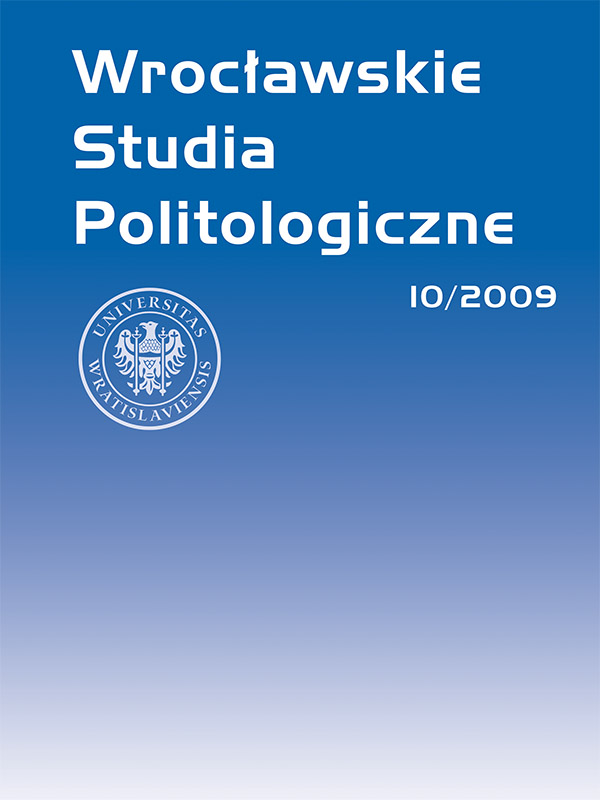

Artykuły

Bosnia and Herzegovina towards European Union – a hard way to association. The problems and challenges of EU policy on Western Balkans at the beginning of 21st Century
During the 1992–1995 war, Bosnia was one of the most destroyed and ruined countries of former Yugoslavia. The result of war has the fortifi cation of political and economic infl uences of moslem states, the military and ideological present of islamic fighters mujaheedens and development of islamic terrorism and fundamentalism. The Dayton Agreement 1995 made as a result two political cantons enititet – Federation of Bosnia and Herzegovina Moslem–Croatian part, area 51% of state and Serbian Republic 49% – formally as one state, but, in fact, two conflicted, ethnic parts. Some factors made a very complicated way of Western Balkans toward European Union–typical authoritarian rules and model of state, ethnic problems, economic problems. After the ending of war and Dayton, the EU policy towards Western Balkans was changed since 1996 and would have to begin preparing future integration with 5 states Croatia, Bosnia and Herzegovina, Former Yugoslavian Republic of Macedonia, Federal Republic of Yugoslavia, Albania. The aims of EU policy for region were showed in Declaration from Sarajevo Nov 1997, and economical aid and program CARDS. The relations with post-war Bosnia in EU policy was especially watched between 1997–2000 Regional Aproach – the EU establishes political and economical conditionality for the development of bilateral relations, EU/Bosnia Consultatives Task Force, the EU proposes the SAP for five countries, the Feira European Council states that all the SAP countries are “potential candidates” for EU membership, Zagreb Summit launches the SAP for five countries–including Bosnia and Herzegovina. In October 2003 first president, Alija Izetbegovic radical islamist, authoritarian ruler died. The next stage of Bosnia and other Western Balkan countries–EU relations was Thessaloniki European Council June 2003, and in 2004 the EU decides on the first European Partnership for B&H. In the same year EUFOR “Althea” military operation replaces NATO’s SFOR mission and starts sworking with High EU Representative. The main problems of Bosnia and Herzegovina towards EU integration were/are: political and ethnic conflicts Bosniaks/Moslems, Croats, Serbs, two cantons as separate parts of one state with different laws, and ethnic armies. Except this, corruption, criminality, illegal arms trading, immigration, drugs trading, women and children trading, return of displaced person, and very high unemployment 40–44%. The other problems were/are: cooperation with International Crime Tribunal for Yugoslavia ICTY in Hague and some war criminal person to appearing – Serb Republic Army in Bosnia commander – general Mladić, Prime Minister Radovan Karadžić arrested 2008 and some other people, police reform, one army and a new constitution of country. The first steps to liquidate the departed state were: the new symbols of state one state flag for two separate parts – 2003, Central Ministry of Defence Jan 2006, beginning of one state army building, and one police for the whole Bosnia Apr 2008. 25 November 2005 – SAA negotiations are officially opened in Sarajevo, and next etap – the first Reform Process Monitoring RPM meeting is held replacing the Consultative Task Force 2006. After this year the general etaps of Bosnia and Herzegovina in integration with EU process were from “potential candidate to association”. The key problems and successes were described in European Parliament Report 15 Mar 2007. Some important successes on political way of Bosnia to EU in 2007–2008 were: initiation of the SAA Agreement 4 Dec in Sarajevo and visa facilitation and readmission agreements 1 Jan 2008, 20 Febr Bosnia signed the IPA Framework Agreement, presentation of the “road map” by European Commision setting out benchmarks for visa liberalization. One of the historical moments in Bosnia and Herzegovina relations with the EU were signification of SAA Agreement in 16 June 2008 and Interim Agreement in Luxembourg. Meanwhile, after the Independence Declaration of Republic Kosovo 17 Feb 2008 political relations with Serb Republic in Bosnia and EU High Representative, Miroslav Lajčak started to be very complicated and became a potential danger to proclamate secession by Serbs.